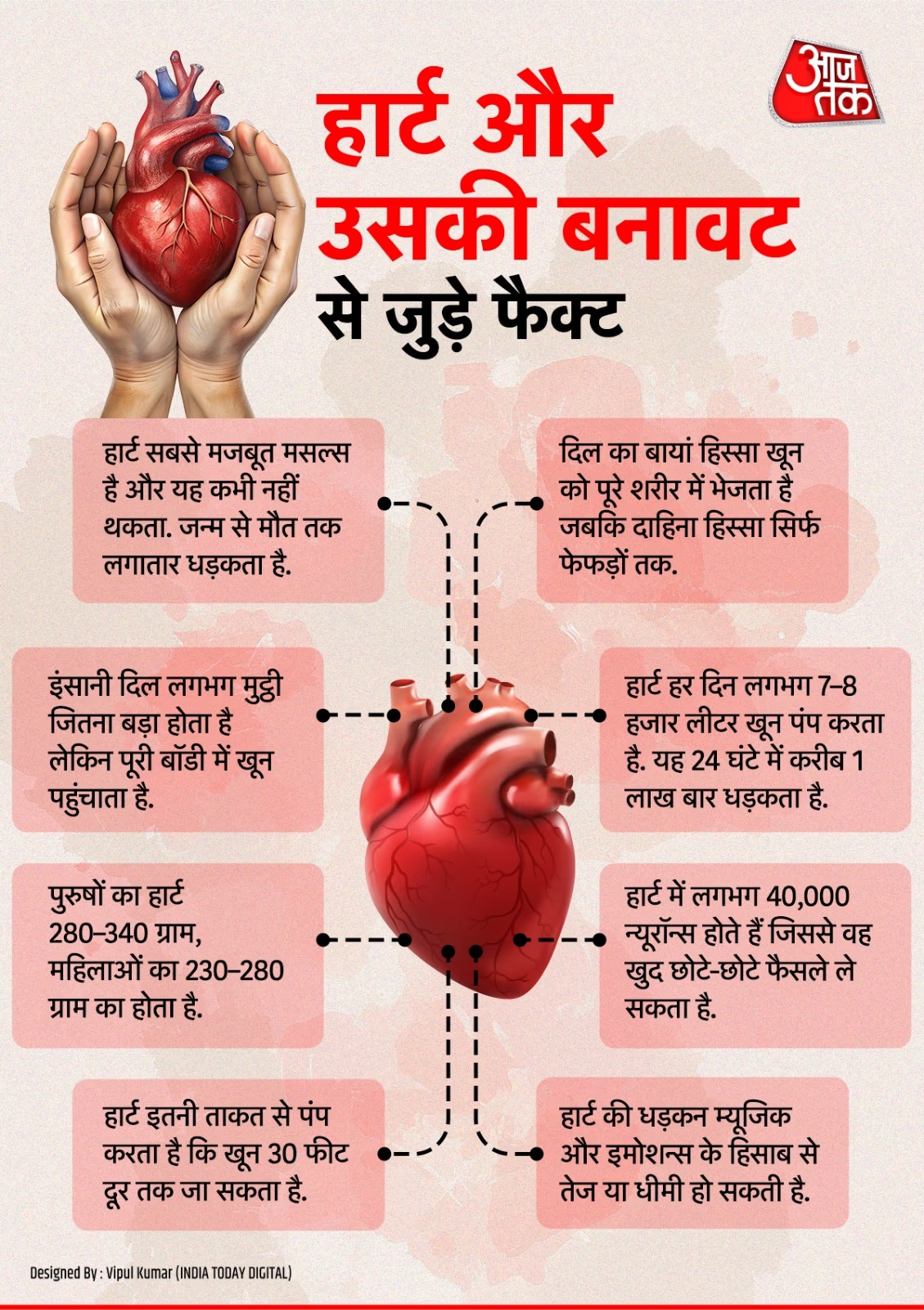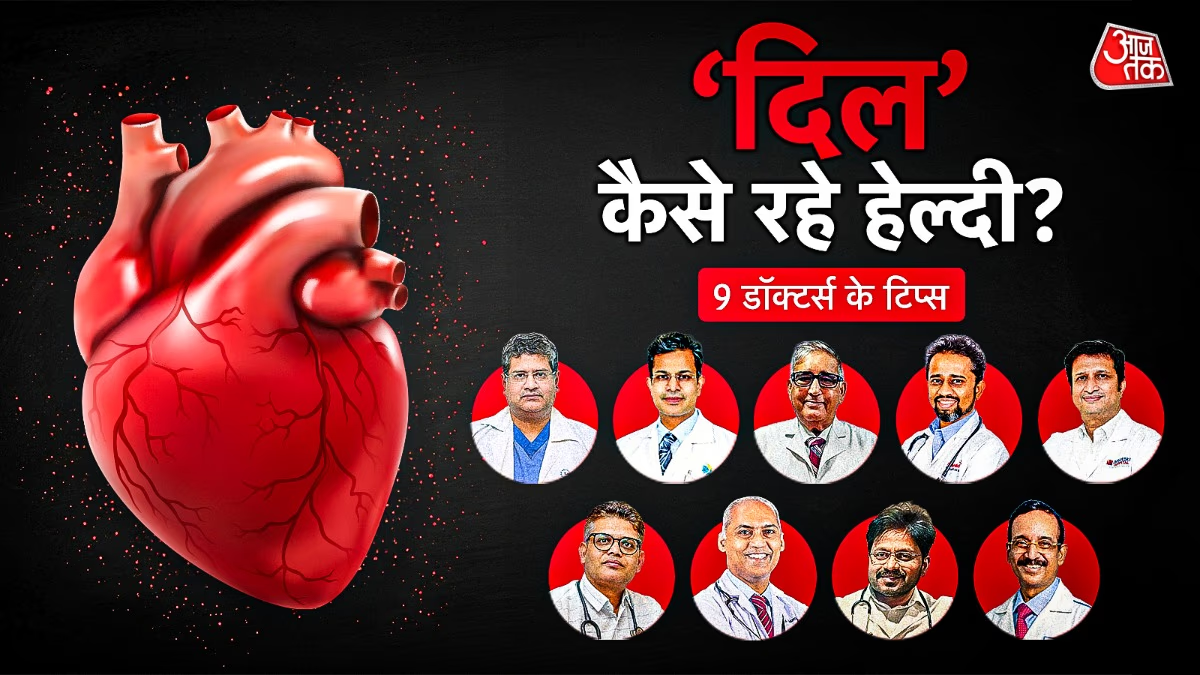The Heart Beats On...
A Small Heart...
The Heart is Still a Child...
Our beloved film songs often use the heart as a metaphor for expressing love or sharing one’s condition. However, the heart is not just a poetic muse; it is the vital engine of our body, keeping us alive by pumping blood continually from birth till death. On September 29, the world unites to celebrate World Heart Day, raising awareness about heart health everywhere. On this occasion, we unravel the significance of the heart's beats through insights from 9 heart experts, surgeons, and cardiologists, addressing crucial questions relating directly to our life.
Can the heart age before the body?
Dr. Ramakant Panda, esteemed cardiologist and Padma Bhushan awardee, shared with Aajtak.in, 'The heart can age differently from the body. Instances of 21 or 30-year-olds with a heart aged like a 50 or 60-year-old are common due to poor lifestyle choices like late nights, junk food, smoking, and stress. Conversely, I've treated 90-year-olds with the fitness of a 60-year-old heart. The good news is lifestyle changes can reverse heart age. Eating natural food is key. Include millet, ragi, brown rice, pulses, chickpeas, beans, and seasonal fruits and vegetables.'
Young individuals wanting a healthy heart should engage in at least 50 minutes to an hour of brisk walking or aerobic exercise daily (300 minutes a week), with some weight training days weekly. Manage stress with yoga and prefer natural, whole grains over processed food. Today's generation often neglects sleep; unknown to them, sleep deprivation and stress harm the heart. One should aim for an 8-hour sleep, winding down by 10 PM. Excess screen time disrupts the body’s natural biology, necessitating adjustments.
How do new fitness trends harm the heart?
Dr. Panda noted, 'Three decades ago, seeing heart patients under 30 was rare, now it's routine. The rise of extreme fitness culture, steroids, crash diets, and over-exercising, coupled with nutritional gaps and artificial supplements, impact the heart. Avoid artificial protein shakes and supplements. I've treated cases where young men developed liver enzyme issues due to protein powders. Exercise only as much as the body can handle. Excessive weightlifting or pushing limits overloads the heart and can trigger attacks.'

Source: aajtak
Does the typical Indian diet (ghee, fried items, salt) secretly damage our heart?
Dr. Prashant Nair, consultant in cardiology at Mumbai's Kokilaben Dhirubhai Ambani Hospital, stated, 'Indian meals are nutrient-rich, yet excessive consumption of ghee, fried foods, and high-salt items elevates LDL (bad) cholesterol, triglycerides, and blood pressure. Over time, this fosters endothelial dysfunction, arterial stiffness, and atherosclerotic plaque buildup, heightening coronary artery disease risk significantly. Regular monitoring of the lipid profile and blood sugar levels, along with dietary control, is crucial for preventing heart conditions.'
Does continuous air pollution impact the heart akin to smoking?
According to Dr. Nair, 'Prolonged exposure to air pollution, particularly fine particles like PM2.5, adversely affects the body, inflames, and damages blood vessels, causing them to stiffen and accumulate fatty deposits. This increases risks of heart attacks, acute coronary syndrome, strokes, and arrhythmias, deeming pollution exposure as hazardous to heart health as smoking. Heart patients should ensure pollution precautions and avoid polluted areas.'
What’s causing the surge in heart attacks among the 30–35 age group?
Dr. Nair unveiled, 'There's a noticeable uptick in premature heart attacks among the youth, primarily due to unhealthy lifestyles and dietary habits. Young adults spending hours seated, consuming excessive calories, processed foods, experiencing constant stress, sleep deprivation, and substance abuse internally weaken the body. Consequently, diabetes, hypertension, and bad cholesterol issues surface early, and if a family history exists, risks escalate. Timely health checkups, lifestyle adjustments, a balanced diet, and ample sleep can significantly mitigate this risk.'
Why are slim individuals afflicted with heart diseases like those who are overweight?
Dr. Nair clarified, 'Judging heart health solely on Body Mass Index (BMI) is misleading. Some individuals, despite normal weight, grapple with visceral fat, insulin resistance, bad cholesterol, or elevated blood pressure. While appearing thin, internally, they contend with heart-related issues. Medically termed 'lean but metabolically unhealthy,' it's vital to maintain heart checkups along with weight to recognize and diminish potential threats in time.'
Can we rely on health-tracking devices for heart rate data accuracy?
Dr. Nair cautioned against fully trusting data from wearables like smartwatches, which consistently monitor heart rhythm and activity, alerting users to anomalies. While useful, they aren't diagnostic-precise. For medical certainty regarding heart rhythm disturbances or blocks, ECG, echocardiography, or other tests remain necessary. Thus, reliance solely on these devices is not recommended.'
Could stress and anger cause heart attacks?
Discussing stress and anger's impact on heart attack risk, Dr. Nair noted, 'Intense anger or stress is hazardous to heart health. Such episodes intensely spike blood pressure and heart rate, activating stress hormones in the body. For those already prone to heart ailments, clots can form from ruptured plaques during these states, escalating to attacks.' Emphasizing stress management, meditation, regular checkups, along with healthy diets and avoiding smoking, can lower stress and anger significantly.
How is today's generation risking their heart health?
Dr. Suresh G. Vision, from Mumbai's Lilavati Hospital, warned, 'Today's youth, engulfed in unhealthy lifestyles, are endangering their hearts. Erratic sleep patterns, prolonged screen time, processed and salty foods, alcohol, smoking, and elevated stress levels contribute to early hypertension, diabetes, and cholesterol imbalances, fostering atherosclerosis and predisposing them to early heart diseases.'
Do energy or sugary drinks elevate heart attack risks?
Dr. Suresh revealed, 'Excessive caffeine and sugar-rich energy drinks over-stimulate the sympathetic nervous system, raising blood pressure and heart rate, presenting alarming symptoms. Though sporadic drinking shows no immediate threat, consistent consumption significantly heightens sudden heart attack risks, especially among youth and those with heart diseases. Sugary drinks contribute to obesity and metabolic syndrome, further exacerbating heart disease risk.'
Does prolonged sitting (sedentary jobs) adversely affect the heart?
According to Dr. Suresh, 'Prolonged sitting is now equated with




